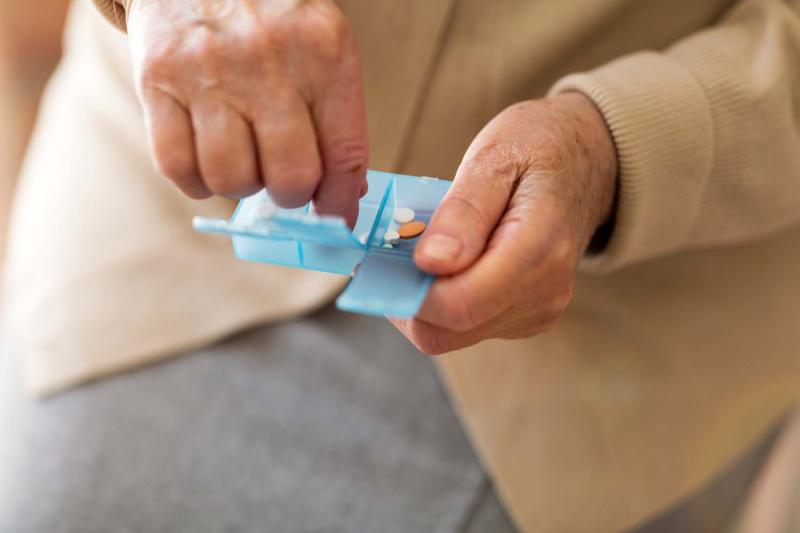Key points
- Medicines optimisation is designed to ensure that medication is safe and beneficial to people living with dementia.
- According to six systematic reviews, the evidence surrounding medicines optimisation was very mixed.
- Some studies report benefits for outcomes such as quality of life, falls, medication use, the use of healthcare services, and mortality. Other studies found little to no effect on these same outcomes.
Medicines optimisation is a person-centred approach designed to ensure that medication is safe and beneficial for the person living with dementia. [1] There are multiple approaches to optimise medication, including:
- Medication reviews (a systematic check done by a GP, pharmacist, or sometimes a psychiatrist)
- Staff education
- The use of clinical decision support technology
- Multidisciplinary case conferences. [1]
This evidence theme on medicines optimisation is a summary of one of the key topics identified by a scoping review of dementia research. If you need more information on this topic, try using the PubMed search below.
We found six systematic reviews that assessed the impact of medicines optimisation for people living with dementia. Overall, the evidence surrounding medicines optimisation was very mixed. Some studies report benefits for certain outcomes, but other studies found little to no effect. Currently, it is unclear whether medicines optimisation interventions have any impact on:
- Quality of life [2]
- Falls and safety [2-4]
- Use of psychotropic and/or antipsychotic medication [2-6]
- Healthcare use (e.g., hospital admission, GP and emergency department visits) [2, 3]
- Mortality. [2, 3]
The reviews highlighted concerns about the methods used in some of the studies. This reduces the degree of certainty we might have about the benefits of medicines optimisation. For example,
- Some studies only had a small number of participants. [2, 3]
- Potentially important outcomes were not assessed (e.g., staff and physicians’ opinions on medicines optimisation). [1, 5]
- Studies were not always clear about what they did and what they found. [2-5]
- Be familiar with Australian guidelines on medication management for people living with dementia (see resources below for some suggestions).
- See palliAGED webpage withdrawing treatment and deprescribing for practice tips.
- Refer or escalate to your line manager any medication-related concerns you may have for a person living with dementia.
- Complete online learning about medication and dementia (see below).
- Encourage and support staff to undertake regular training and be familiar with current guidelines and tools.
- Invite GPs or pharmacists to undertake regular medication reviews in both residential and home care (funded under Medicare). [7, 8]
- Organise multidisciplinary case conferences to discuss individuals’ care needs and goals.
- Almutairi H, Stafford A, Etherton-Beer C, Flicker L. Optimisation of medications used in residential aged care facilities: A systematic review and meta-analysis of randomised controlled trials. BMC Geriatrics. 2020;20(1):236.
- Shafiee Hanjani L, Long D, Peel NM, Peeters G, Freeman CR, Hubbard RE. Interventions to optimise prescribing in older people with dementia: A systematic review. Drugs Aging. 2019;36(3):247-67.
- Forsetlund L, Eike MC, Gjerberg E, Vist GE. Effect of interventions to reduce potentially inappropriate use of drugs in nursing homes: A systematic review of randomised controlled trials. BMC Geriatrics. 2011;11:16.
- McGrattan M, Ryan C, Barry HE, Hughes CM. Interventions to improve medicines management for people with dementia: A systematic review. Drugs Aging. 2017;34(12):907-16.
- McDerby N, Kosari S, Bail K, Shield A, Peterson G, Naunton M. Pharmacist-led medication reviews in aged care residents with dementia: A systematic review. Australas J Ageing. 2020;39(4):e478-e89.
- Thompson Coon J, Abbott R, Rogers M, Whear R, Pearson S, Lang I, et al. Interventions to reduce inappropriate prescribing of antipsychotic medications in people with dementia resident in care homes: A systematic review. J Am Med Dir Assoc. 2014;15(10):706-18.
- Pharmacy Programs Administrator. Residential Medication Management Review and Quality Use of Medicines [Internet]. 2022 [cited 2023 Jun 30]. Available from: https://www.ppaonline.com.au/programs/medication-management-programs/residential-medication-management-review-and-quality-use-of-medicines.
- Healthdirect. Home medicines review [Internet]. Australia: Healthdirect; n.d. [cited 2023 Jun 30]. Available from: https://www.healthdirect.gov.au/home-medicines-review.
Connect to PubMed evidence
This PubMed topic search is limited to home care and residential aged care settings. You can choose to view all citations or citations to articles available free of charge.


